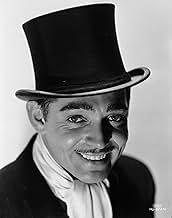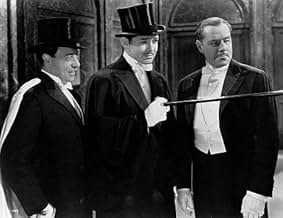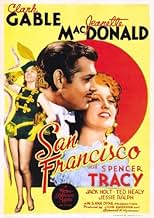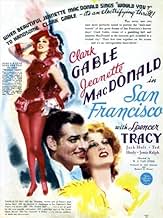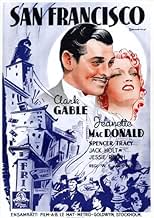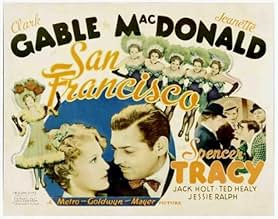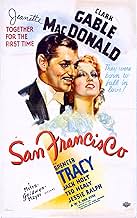IMDb-BEWERTUNG
7,1/10
6456
IHRE BEWERTUNG
Füge eine Handlung in deiner Sprache hinzuA Barbary Coast saloonkeeper and a Nob Hill impresario are rivals for the affections of a beautiful singer, both personally and professionally, in 1906 San Francisco.A Barbary Coast saloonkeeper and a Nob Hill impresario are rivals for the affections of a beautiful singer, both personally and professionally, in 1906 San Francisco.A Barbary Coast saloonkeeper and a Nob Hill impresario are rivals for the affections of a beautiful singer, both personally and professionally, in 1906 San Francisco.
- Regie
- Drehbuch
- Hauptbesetzung
- 1 Oscar gewonnen
- 5 Gewinne & 6 Nominierungen insgesamt
Charles Judels
- Tony
- (as Charles Judells)
Warren Hymer
- Hazeltine
- (as Warren B. Hymer)
Empfohlene Bewertungen
MGM's blockbuster was conceived originally as a vehicle for Jeanette MacDonald to co-star with some non-singing players while her normal screen partner Nelson Eddy was on a concert tour. Mr. Eddy always considered his screen roles secondary to his concert singing which was the reverse of how Jeanette felt.
According to a recent book about both Eddy and MacDonald, Clark Gable had been gotten out of romantic dalliance with some hush money MGM paid some woman off with. He didn't really want to do the film, but Louis B. Mayer kind of hammerlocked him into it. MacDonald however chose Spencer Tracy for the part of Father Tim Mullin, Gable's best friend and conscience of the movie.
Nevertheless the part of Blackie Norton, impresario of the Barbary Coast in 1906 San Francisco fits Gable perfectly. The man takes his pleasures where he finds them, but has a concern for the folks in his area who are getting the raw end of things from the upper crust on Nob Hill as personified by Gable's rival Jack Holt.
Gable and Holt are rivals for Jeanette MacDonald as well. She's fresh from the country, a parson's daughter with a great set of soprano pipes. Both like what they see, but Holt appreciates her voice quite a bit more than Gable at first.
Besides Ms. MacDonald, Gable and Holt have their differences over some of the rottenly constructed houses on the Barbary Coast and Gable wants a lot of new construction there. Of course the Earthquake of April 18, 1906 settles the whole issue of urban renewal.
If the special effects Oscar was around at that time, San Francisco would have won it for sure. Even over 60 years after the film came out and with the more modern techniques of special effects available, the sight of the earthquake is still visually stunning.
Gable and MacDonald did not get along on the set, Gable was more used to down to earth leading ladies like Crawford and Harlow. MacDonald and Tracy got along just fine. Her intercession with Louis B. Mayer changed the course of Tracy's career forever. Previous to San Francisco, Tracy played a whole slew of roughneck heroes in B films at Fox and his first few at MGM were in the same mold. As Father Tim Mullin, Tracy became the wise father figure (no pun intended) that the public came to know so well. He received his first Academy Award nomination for this part.
Jeanette has some operatic selections and three hymns to sing during the film, The Holy City, Battle Hymn of the Republic, and Nearer My God to Thee. She also got two original songs, Would You and the title tune of the film.
The song San Francisco was adopted by the city fathers of San Francisco as the city's official song. That is until Tony Bennett lost his heart there. Controversy still rages on the bay as to which should be the official song of San Francisco.
San Francisco made a whole lot of money for Leo the Lion that year. It in fact inspired Darryl F. Zanuck to burn down Chicago the following year so he could get in on that disaster epic box office.
San Francisco still holds up well today, the action, the music, and Spencer Tracy's groundbreaking performance. Something for everyone.
According to a recent book about both Eddy and MacDonald, Clark Gable had been gotten out of romantic dalliance with some hush money MGM paid some woman off with. He didn't really want to do the film, but Louis B. Mayer kind of hammerlocked him into it. MacDonald however chose Spencer Tracy for the part of Father Tim Mullin, Gable's best friend and conscience of the movie.
Nevertheless the part of Blackie Norton, impresario of the Barbary Coast in 1906 San Francisco fits Gable perfectly. The man takes his pleasures where he finds them, but has a concern for the folks in his area who are getting the raw end of things from the upper crust on Nob Hill as personified by Gable's rival Jack Holt.
Gable and Holt are rivals for Jeanette MacDonald as well. She's fresh from the country, a parson's daughter with a great set of soprano pipes. Both like what they see, but Holt appreciates her voice quite a bit more than Gable at first.
Besides Ms. MacDonald, Gable and Holt have their differences over some of the rottenly constructed houses on the Barbary Coast and Gable wants a lot of new construction there. Of course the Earthquake of April 18, 1906 settles the whole issue of urban renewal.
If the special effects Oscar was around at that time, San Francisco would have won it for sure. Even over 60 years after the film came out and with the more modern techniques of special effects available, the sight of the earthquake is still visually stunning.
Gable and MacDonald did not get along on the set, Gable was more used to down to earth leading ladies like Crawford and Harlow. MacDonald and Tracy got along just fine. Her intercession with Louis B. Mayer changed the course of Tracy's career forever. Previous to San Francisco, Tracy played a whole slew of roughneck heroes in B films at Fox and his first few at MGM were in the same mold. As Father Tim Mullin, Tracy became the wise father figure (no pun intended) that the public came to know so well. He received his first Academy Award nomination for this part.
Jeanette has some operatic selections and three hymns to sing during the film, The Holy City, Battle Hymn of the Republic, and Nearer My God to Thee. She also got two original songs, Would You and the title tune of the film.
The song San Francisco was adopted by the city fathers of San Francisco as the city's official song. That is until Tony Bennett lost his heart there. Controversy still rages on the bay as to which should be the official song of San Francisco.
San Francisco made a whole lot of money for Leo the Lion that year. It in fact inspired Darryl F. Zanuck to burn down Chicago the following year so he could get in on that disaster epic box office.
San Francisco still holds up well today, the action, the music, and Spencer Tracy's groundbreaking performance. Something for everyone.
"San Francisco" is a very good classic picture. It's in many ways kind of similar to "In Old Chicago", which came out a year after this film. Both films have love stories, both have beautiful sets, and both climax with a disaster that really did take place in their respective cities. "San Francisco" takes place in the mid-1900s. Clark Gable and Spencer Tracy are two of the thousands of people living in the city that was tragically rocked by the massive earthquake of 1906. Like "In Old Chicago", the disaster recreation here is impressive. The film tends to drag a little from time-to-time, but that's only a minor quarrel to an otherwise classy movie. All-in-all, I was pretty entertained by "San Francisco".
*** (out of four)
*** (out of four)
San Francisco, like so many other films from this era, just reminds me again how movies today have lost the art of the build-up. They just hit you over the head with mind-numbing action from frame one. Hollywood(and audiences of today) would do well to watch classics like "San Francisco", where story takes precedence over special effects and when the effects do come, they are in service to the story. And they mean so much more and have so much more impact when held back until the last possible moment. Why can't we allow ourselves to be immersed in the story? Or are we just too impatient for it now?
John Hoffman (my father) was responsible for the Great Earthquake scene and a number the other montage sequences in the film. A friend of his, the film preservationist David Shepard, tells me the film had already been shot, but the studio execs weren't happy with it. So, they handed it over to the then head of MGM's Montage Department, John Hoffman, to see if he could salvage it. Hoffman rewrote, directed and edited many of the scenes. The result: five Oscar nominations (including 'Best Picture') and one win ('Best Sound') released in 1936, it preceded the introduction of the Oscar for Special Effects award by a few years.
A few years ago, when the Academy Awards Ceremony featured a review of the greatest disaster films ever made, I was disappointed to note that San Francisco hadn't been included. Still, from reading the reviews posted here, it's great to see how many people still appreciate it today.
A few years ago, when the Academy Awards Ceremony featured a review of the greatest disaster films ever made, I was disappointed to note that San Francisco hadn't been included. Still, from reading the reviews posted here, it's great to see how many people still appreciate it today.
SAN FRANCISCO is a major Hollywood production from the 1930's, From the Boldness of the opening credits, along with a rousing rendition of the tune by the same name, the viewer suspects that they are going to witness a special movie event.
The plot is a rather forthright formula story of a tug-of-war romance between bad boy Clark Gable (Blackie Nortion, saloon owner) and mama's boy Jack Holt (Jack Burley, scion of a well-to -do family) for the affections of singer Jeanette MacDonald (Mary Blake, beautiful, virginal). It's also a story of good vs. evil, the good portrayed by Spencer Tracy as a Catholic Priest.
But it's the hard-hitting script and it's crisp dialogue, the recreation of a turn-of-the-Century San Francisco, the great acting, the music, and the fabulous Earthquake sequences that make this show the classic that it is.
SAN FRANCISCO is a tale of contrasts. On one hand the Barbary Coast with it's bars and bordellos, yet on the other hand we have a city of the fine arts, opera, and the Nob Hill elite. We have the rich, the spendthrifts, and also the poor who seek shelter in the Mission Houses.
The acting of Clark Gable cannot go unmentioned. His Blackie Norton is the most mockingly amoral character, proud of his lack of religious faith..... relying only on himself. Yet as Father Mullin (Tracy) says at one point in the movie, "Do you know who gave the chapel that organ we've been dedicating tonight? The most scoffing, unbelieving, and godless soul in all San Francisco, ..Blackie Norton. Cost him over $4,000......Don't tell him I told you. Blackie's like that, ashamed of his good deeds as most men are ashamed of their bad."
The famous 1906 Earthquake is a real show-stopper. Entire sets were hoisted on hydraulic lifts and rockers, and literally shaken down. VERY REALISTIC. I would have reservations about showing this picture to kids under 10 years of age. They may develop a neurotic fear of earthquakes following this one.
Enjoy and re-enjoy.
The plot is a rather forthright formula story of a tug-of-war romance between bad boy Clark Gable (Blackie Nortion, saloon owner) and mama's boy Jack Holt (Jack Burley, scion of a well-to -do family) for the affections of singer Jeanette MacDonald (Mary Blake, beautiful, virginal). It's also a story of good vs. evil, the good portrayed by Spencer Tracy as a Catholic Priest.
But it's the hard-hitting script and it's crisp dialogue, the recreation of a turn-of-the-Century San Francisco, the great acting, the music, and the fabulous Earthquake sequences that make this show the classic that it is.
SAN FRANCISCO is a tale of contrasts. On one hand the Barbary Coast with it's bars and bordellos, yet on the other hand we have a city of the fine arts, opera, and the Nob Hill elite. We have the rich, the spendthrifts, and also the poor who seek shelter in the Mission Houses.
The acting of Clark Gable cannot go unmentioned. His Blackie Norton is the most mockingly amoral character, proud of his lack of religious faith..... relying only on himself. Yet as Father Mullin (Tracy) says at one point in the movie, "Do you know who gave the chapel that organ we've been dedicating tonight? The most scoffing, unbelieving, and godless soul in all San Francisco, ..Blackie Norton. Cost him over $4,000......Don't tell him I told you. Blackie's like that, ashamed of his good deeds as most men are ashamed of their bad."
The famous 1906 Earthquake is a real show-stopper. Entire sets were hoisted on hydraulic lifts and rockers, and literally shaken down. VERY REALISTIC. I would have reservations about showing this picture to kids under 10 years of age. They may develop a neurotic fear of earthquakes following this one.
Enjoy and re-enjoy.
Wusstest du schon
- WissenswertesClark Gable did not want to make this film but he was at the mercy of MGM studio head Louis B. Mayer, who had just paid off one of his numerous paramours.
- PatzerAs Blackie walks away from a building being blown up (actually a process shot), Clark Gable's head becomes momentarily transparent.
- Zitate
Jack Burley: [referring to Mary Blake] Well, there's no law against an opera singer being slender, young and beautiful.
- Crazy CreditsPrologue: "San Francisco--guardian of the Golden Gate--stands today a Queen among seaports--industrious, mature, respectable. But perhaps she dreams of the Queen and city she was--splendid and sensuous, vulgar, and magnificent--that perished suddenly with a cry still heard in the hearts of those who knew her, at exactly 5:15 a.m. April 18, 1906."
- Alternative VersionenAfter initial premiere, the manager of the Paramount Theater in San Francisco added to the downbeat ending a few shots showing the Golden Gate Bridge being built. Seeing the positive public reaction, MGM decided to have the sequence added to all other prints in release.
- VerbindungenEdited into What Price Safety! (1938)
- SoundtracksSan Francisco
(1936)
Music by Bronislau Kaper and Walter Jurmann
Lyrics by Gus Kahn
Played during the opening credits and often in the score
Sung by Jeanette MacDonald (uncredited)
Reprised by her and others at a political rally and at the end
Top-Auswahl
Melde dich zum Bewerten an und greife auf die Watchlist für personalisierte Empfehlungen zu.
- How long is San Francisco?Powered by Alexa
Details
Box Office
- Budget
- 1.300.000 $ (geschätzt)
- Laufzeit
- 1 Std. 55 Min.(115 min)
- Farbe
- Seitenverhältnis
- 1.37 : 1
Zu dieser Seite beitragen
Bearbeitung vorschlagen oder fehlenden Inhalt hinzufügen


